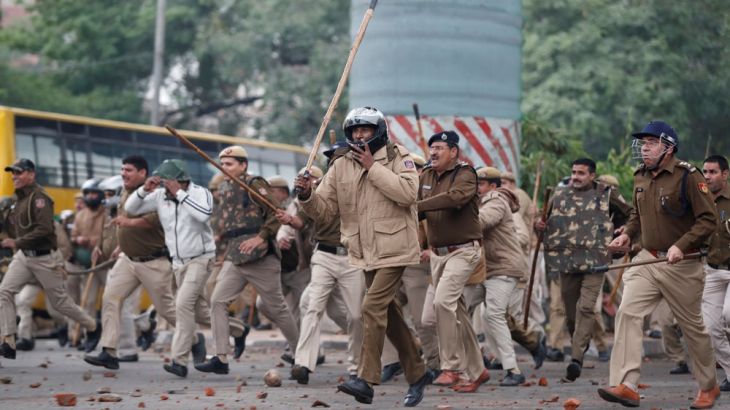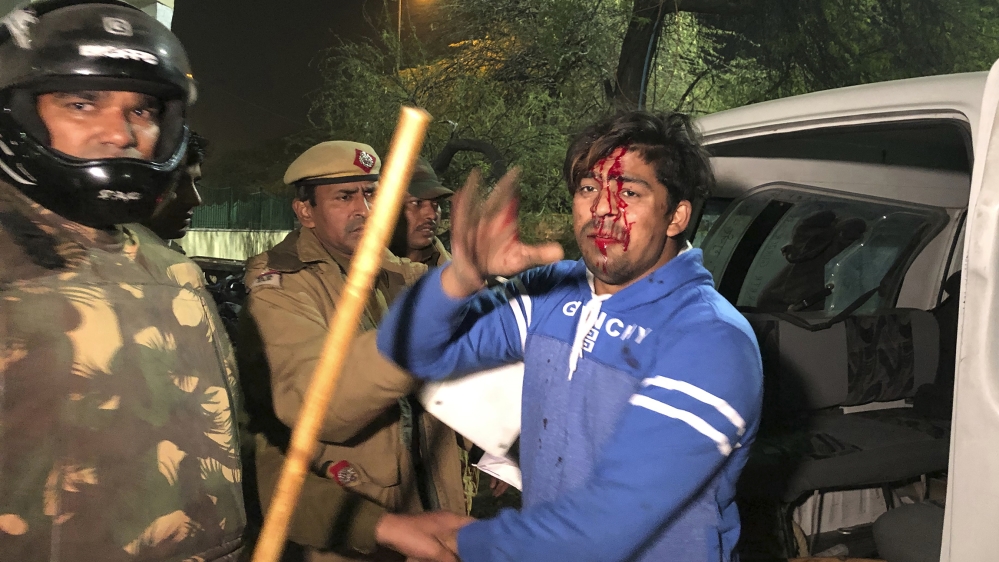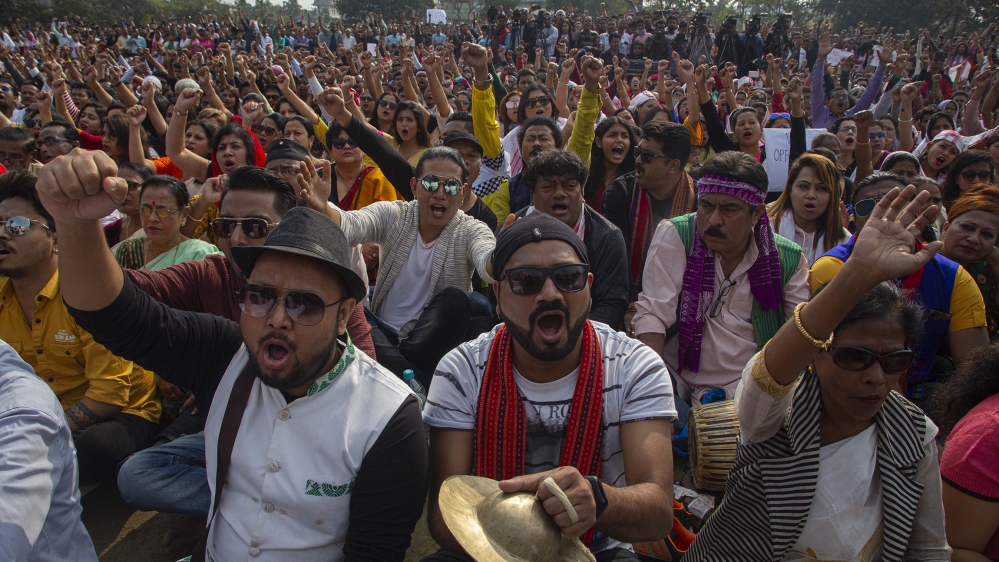Police fire tear gas as Delhi protesters decry citizenship law
Tensions remain high across India as several killed in Assam protests against the ‘anti-Muslim’ citizenship law.

Indian police have fired tear gas and resorted to baton charges to disperse thousands of demonstrators, including students, in New Delhi as protests against a new citizenship law continued for a fifth straight day across the country.
The death toll from violent protests against the law in India rose to six on Sunday, including four shot by police, with authorities maintaining internet bans and curfews in some northeastern regions.
Keep reading
list of 4 itemsBiden labels Japan and India ‘xenophobic’ along with China and Russia
After deadly attack, Russia’s Central Asian workers report rising racism
‘Feel less and less like playing’: Vinicius Jr in tears over racist abuse
A Reuters news agency witness said police resorted to baton charges and firing tear gas on the protesters to disperse them in south Delhi. The half a kilometre stretch of road where the protesters had gathered was strewn with glass, stones, broken bits of bricks and overturned motorcycles.
“About 4000 people were protesting and police did what they did to disperse them when the crowd burnt buses,” said Chinmoy Biswal, a senior police officer in the area. “If it had been a peaceful mob it would have been dispersed peacefully.”
Police later in the evening stormed into the nearby Jamia Milia Islamia University campus where many protesters were believed to have fled, and fired tear gas on the campus and marched some students out, while detaining others.

Mohmmad Minhaj Uddin, a LLM student at the university, told Al Jazeera he was beaten by police and wounded in his eye.
“I don’t know why I was beaten up. I wasn’t even protesting. I was in the university library when police entered the campus,” the 26-year-old told Al Jazeera.
“They broke the lock of the library gate and entered inside and beat everyone who came in their way,” he said. “In panic, I fell on to the ground. They hit me on the eye.”
Mohammad was rushed to Al-Shifa Hospital in Jamia Nagar, where he received treatment.
An official at the hospital told Al Jazeera on condition of anonymity that at least 60 students were brought to the hospital with injuries.
Local media reported that police also used tear gas at the Aligarh Muslim University (AMU), India’s largest minority institution, which is about 130 kilometres away from the capital.
‘Long live Assam’
Tension remained high in Assam state’s biggest city, Guwahati, as four people died in hospital after being shot, while another died when a shop he was sleeping in was set on fire and a sixth after he was beaten up during a protest, the AFP news agency quoted the local officials as saying.
Some 5,000 people took part in a fresh demonstration in Guwahati on Sunday, with hundreds of police watching on as they sang, chanted and carried banners with the words: “Long live Assam”.

Officials said oil and gas production in the state was hit buy the curfew, although the restrictions were eased during the day on Sunday with some shops opening.
Violent protests have raged in Assam since India’s Parliament passed the new law on Wednesday, which allows New Delhi to grant citizenship to undocumented immigrants who entered India from three neighbouring countries on or before December 31, 2014 – but not if they are Muslim.
Critics say the law, pushed by Prime Minister Narendra Modi‘s Hindu nationalist government, violates the secular principles of India’s constitution by discriminating against a community.
Old wounds re-opened in Assam
But the new law has also reopened old wounds in Assam state, a region sandwiched between Bangladesh, China and Myanmar which has long seethed with interethnic tensions and where armed tribal groups are still resisting being a part of India.
Assam has long seen hostility between locals and Bengali-speaking immigrants brought by the British to toil on tea plantations or who flowed in around Bangladesh’s 1971 war of independence.
Years of agitation driven by student organisations that included the 1983 Nellie massacre – when at least 2,000 people were butchered in six hours – only ended in 1985 with the Assam Accord.
Journalist Sangeeta Barooah Pisharoty, who works for The Wire website, told Al Jazeera that Assamese people see the new law as a “direct violation” of the 1985 accord.
“The accord was to allow all who had come to Assam until 1971 to be citizens, not December 2014 as this new law says,” she said. “When you try to tinker with that, you’re actually setting off a fire.”
On Sunday, Home Minister Amit Shah called for calm, saying local cultures in northeastern states were not under threat, amid fears the new law will grant citizenship to large numbers of immigrants from neighbouring Bangladesh.
“Culture, language, social identity and political rights of our brothers and sisters from northeast will remain intact,” Shah told a rally in eastern Jharkhand state, News18 television network reported him as saying.
Meanwhile, in the neighbouring state of West Bengal, demonstrators on Sunday set fire to tyres, staged sit-ins on highways and railway tracks, and torched trains and buses to protest the citizenship law.
Riot police was brought in to disperse protesters and train services suspended in some parts of eastern India.
West Bengal Chief Minister Mamata Banerjee – who has spoken out against the national government’s push for the law – suspended internet services in several districts of the state.
New Delhi
December 15, 2019, Sunday pic.twitter.com/Z54PW6Ovfn— Vinod K. Jose (@vinodjose) December 15, 2019
India’s opposition parties, rights activists and others see the new law as part of Modi’s agenda to marginalise India’s 200 million Muslims.
The main opposition Congress party held a rally in the capital, New Delhi, on Saturday, where its interim president Sonia Gandhi called the citizenship bill “dangerous”.
“Modi and Shah [PM Modi and Home Minister Shah] don’t care. This citizenship amendment bill they brought in recently will shatter the soul of India, like what is happening in Assam and the northeastern states of the country.”
Speaking to Al Jazeera, Swaraj India party’s founder Yogendra Yadav used a Nazi analogy to explain the implications of the new law.
“It is the beginning of something very pernicious. You first put a star, then you put people in a ghetto and then you finally take them to the end-point,” he said.
“This, unfortunately, could be the beginning of what could result in disenfranchisement of a very significant population in India.”
Political leaders in the states of Kerala, Punjab and West Bengal have all said publicly they will not implement the law – leading to a potential conflict with New Delhi.
Rights groups and a Muslim political party are challenging the citizenship law in the Supreme Court.
Modi’s Bharatiya Janata Party (BJP) ally in Assam, which had supported the bill in Parliament, told local media on Sunday that it also intended to challenge the law in court.
“It seems a long political, social and cultural fight is on the cards for Prime Minister Narendra Modi and his government,” said Al Jazeera’s Sohail Rahman, reporting from New Delhi.
Bilal Kuchay contributed to this report from New Delhi